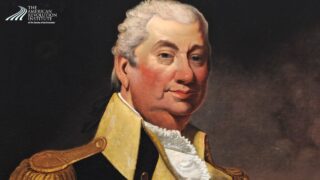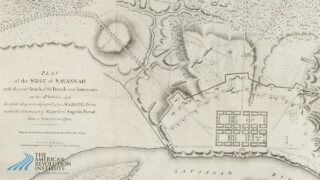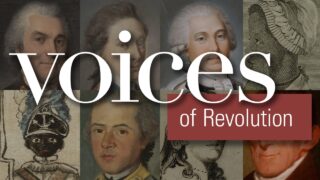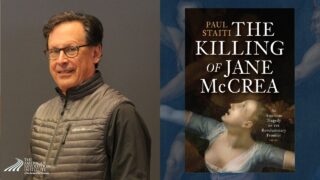Supporting scholarship and promoting popular understanding of the American Revolution is central to the work of the American Revolution Institute. The Institute welcomes distinguished scholars and authors to share their insights and discuss their latest research with the public at Anderson House through lectures, author's talks and panel discussions. The Institute also hosts a variety of other historical programs throughout the year, including our Lunch Bite object talks, battlefield tours, special Anderson House tour programs and other events. Many of the events we offer are free.

February 2026
From the Vault—Henry Knox and the Artillery of the American Revolution
Join us for a special program honoring Maj. Gen. Henry Knox, chief of artillery of the Continental Army and one of George Washington’s most trusted officers. This intimate evening event offers a rare opportunity to explore treasures from our library collections that illuminate Knox’s extraordinary wartime service and enduring legacy. Featured manuscripts, maps, prints and rare publications reveal his remarkable rise from Boston bookseller to indispensable military leader. Guests will learn how Knox transformed the Continental Army’s artillery, forged critical…
Find out more »March 2026
Virtual Lecture— Loyalists & Liberty: Savannah in the American Revolution
Historian Catherine Duffy, chief curator for the Coastal Heritage Society in Savannah, Ga., discusses the unexpected discovery of nineteen Revolutionary War cannons found in the Savannah River in 2021. Since the recovery of the cannons and other antiquities, the U.S. Army Corps of Engineers, George State Department of Natural Resources, and Coastal Heritage Society have joined forces to conserve the historic treasures. Upon completion of the conservation efforts, the cannons and other artifacts will be displayed in a new core…
Find out more »Special Opening Reception — Voices of Revolution
Join us for a reception celebrating the opening our new exhibition, Voices of Revolution. Over eight long years, the American Revolution was fought across large swaths of North America and beyond, involving the militaries of at least five nations. It touched the lives and families of nearly everyone in what would become the United States, yet the full scope of who participated in our Revolution and the effects it had on those who fought in it remains less understood. On view…
Find out more »Lecture—Rebels at Sea: Privateering in the American Revolution
Independent historian Eric Jay Dolin explores American privateers during the American Revolution. The heroic story of the founding of the U.S. Navy during the Revolution has been told before, yet missing from most maritime histories of the war is the ragtag fleet of private vessels that truly revealed the new nation’s character―above all, its ambition and entrepreneurial ethos. Drawing from his research, Dolin corrects that significant omission and contends that privateers, though often seen as profiteers at best and pirates at…
Find out more »Author’s Talk—The Killing of Jane McCrea: An American Tragedy on the Revolutionary Frontier
Paul Staiti, professor of fine arts at Mount Holyoke College, discusses his new book that, for the first time, undertakes a comprehensive investigation into the life, death, and legacy of Jane McCrea, who was killed by a Native American warrior serving alongside British general John Burgoyne’s 1777 expedition in New York. Using both visual arts and written records, Professor Staiti reassembles the scattered fragments of McCrea’s story to illuminate a historical terrain long since shrouded in misinformation, controversy, and mythology.…
Find out more »



